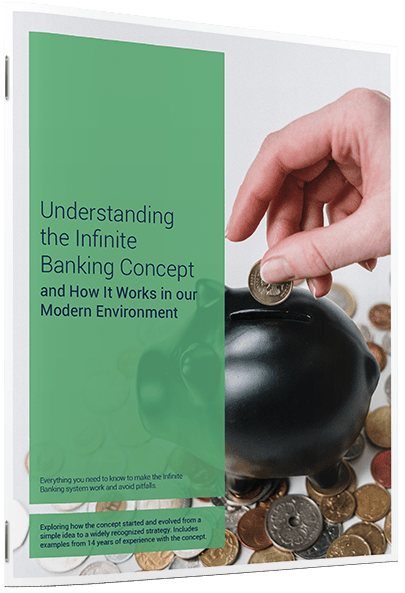702-660-7000
702-660-7000
Can you have multiple life insurance policies? The simple answer is yes. You can have multiple life insurance policies. You can even have more than one policy with the same insurance company. It’s actually common to have a term insurance policy as well as a whole life insurance policy.
You may also wonder how many life insurance policies can you have? How many policies you can have depends on your insurer and your insurability limit which is known as your “human life value”. Some people try to get as many policies as possible, but is it beneficial?
We just answered your question, “Can you have multiple life insurance policies?” But now the question is: should you? There are those who insist that purchasing multiple life insurance policies, even a couple at a time, is better than purchasing or owning just one. But our research has proven otherwise.
That being said, borrowing from one policy to fund another policy on a long term or permanent basis is often called laddering. But laddering is imprudent. Leveraging one policy to fund another policy will create a compounding interest rate that can destroy the first policy or worse yet, create a situation where one or both policies lapse and you end up owing taxes on the growth that was created by the dividend payments.
 |
Get a working knowledge of how each type of life insurance policy works. After reading this 10-page booklet you'll know more about life insurance than most insurance agents. Download here> |
People have been led to believe that a policy can sustain itself with an outstanding policy loan against it merely on the internal rate of return and dividends of the policy itself. That is simply not true! Especially in this age of low interest rates and moderate dividends. But attempting to purchase any life insurance policy without first evaluating the long-term cost to benefits is folly. And adding additional policies only intensifies that folly.
Policy loans should never be taken against a policy unless the owner knows that the interest and the premium on that policy can be paid out of their pocket. To do otherwise is risking the possibility of inadvertent taxation, policy lapse and financial loss.
Life insurance is a great way to protect your family and provide peace of mind. The basic rule of purchasing any life insurance should be affordability and comfort. If a premium is not affordable you can’t purchase the policy. And if the premium is not comfortable then you most likely will not continue to fund the policy and that can be costly to you.
The big news about life insurance today is that it costs much less than most people believe it does. This is true about both Term life insurance and participating Whole Life insurance. And that means that there is never a better time to see what a policy would cost on your life or the life of a child, spouse or grandchild.
You can get a free life insurance quote from McFie Insurance here or you can call the office and talk with someone 702-660-7000.
At McFie Insurance, we’re not just into selling life insurance, we want our customers to be successful and have financial peace of mind. The way we see it, it is our responsibility to stay with our customers and help them use their life insurance to grow their wealth.
That’s why we’ll not only provide you with a quote, we’ll provide you with the information you need to know to make a good decision about how much coverage you can afford and what type of policies are best for you. If you don’t know what kind of policy is best for you, schedule an appointment with a McFie Insurance expert.

Understanding the Infinite Banking Concept and How It Works In Our Modern Environment 31-page eBook from McFie Insurance Order here>
You can have more than one life insurance policy. The allowable number typically depends on the total amount of coverage. If life insurance providers think you have excessive insurance, they may refuse additional policy applications. The amount of coverage you’re eligible for is usually influenced by your financial assets, debts, and income. However, having multiple policies is typically unnecessary.
It’s advisable for married couples, especially those with dependent children or where one spouse relies on the other’s income, to consider multiple life insurance policies. Some options include purchasing a joint life insurance policy, survivorship life insurance, or two individual policies. Joint life insurance, also called “first to die insurance”, is a permanent policy covering both partners, with the benefit paid to one spouse when the other dies. Survivorship life insurance is a permanent policy covering both partners, with the benefit paid to the heirs only after both spouses have died. Comparing the costs between a joint policy, survivorship policy, and two individual policies is crucial, so consulting with a financial advisor or insurance agent is recommended for the best decision.
Applying for multiple life insurance policies from different insurers is legal, but it might not always be the wisest strategy. Most insurers use a shared database to monitor applications, and applying to several companies simultaneously could give the impression of attempting to obtain excessive insurance. This could lead to the rejection of some or all applications. To avoid this, working with an insurance agent or financial advisor is beneficial. Additionally, acquiring multiple policies from the same insurer is often more straightforward than getting them from various companies.
 Tomas P. McFie DC PhD
Tomas P. McFie DC PhD
Tom McFie is the founder of McFie Insurance and co-host of the WealthTalks podcast which helps people keep more of the money they make, so they can have financial peace of mind. He has reviewed 1000s of whole life insurance policies and has practiced the Infinite Banking Concept for nearly 20 years, making him one of the foremost experts on achieving financial peace of mind. His latest book, A Biblical Guide to Personal Finance, can be purchased here.